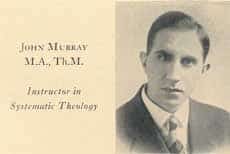The Reformed faith and Modern Substitutes
 It is one thing to take a strong stand for the fundamentals of the faith and come out from that denomination which denies them. It is quite another thing to stand for the essentials of the Reformed faith in the new denomination which you have started with others of similar convictions. This latter matter was the issue facing the early years of the Presbyterian Church of America.
It is one thing to take a strong stand for the fundamentals of the faith and come out from that denomination which denies them. It is quite another thing to stand for the essentials of the Reformed faith in the new denomination which you have started with others of similar convictions. This latter matter was the issue facing the early years of the Presbyterian Church of America.
For that reason, Professor John Murray wrote a whole series for the Presbyterian Guardian in 1935 – 1936 (its archival material is on-line now) on The Reformed Faith and Modern Substitutes. The latter part of the title dealt with two: Arminianism and Modern Dispensationalism. Readers desiring to get a biblical view of the first substitute are urged to read the Feb 17 and March 16, 1936 issues (Vol 1, numbers 10, 12) The second Modern Substitute was dispensationalism, as it was then being taught and practiced by the Scofield Reference Bible and all kinds of Bible institutes and churches. Professor Murray would deal with this substitute in the May 18, 1936 (Vol. 2 No. 4) issue of the Presbyterian Guardian.
[click here to read the 18 May 1936 issue of The Presbyterian Guardian.]
Murray’s point could hardly be missed in the article. He wrote, “What we are intent upon showing is that the system of (i.e. dispensationalism) interpretation widely prevalent in this country . . . is inconsistent with the system of truth embodied in our Presbyterian standards.”
Why was this emphasis needed to these Presbyterian pastors and people in the mid-thirties in our Presbyterian church scene? Arminianism may not have been a problem in the infant Presbyterian church, though this false belief can weave its way into many a congregation. Of far greater issue was modern dispensationalism. The fact that there was a concern with their reader’s misunderstanding about the series of articles led one reporter of the Presbyterian Guardian to seek to clarify what was and what was not being said by Professor Murray.
What was not being said was that all pre-mils in the church were contrary to the Reformed Faith. It was pointed out that pre-mils could be found on the board and faculty of Westminster Seminary, the Independent Board for Presbyterian Foreign Missions, and the Presbyterian Constitutional Covenant Union. There was no inconsistency between the Reformed Faith and a belief in the premillennial return of Christ. There was to be a wide area of liberty in the doctrine of last things as it dealt with millennial issues.
However, what was being said was that the dispensational viewpoint regarding the unity of the Scriptures, the unity of salvation, and the unity of the church was contrary to the Reformed faith. The new church wanted to be in reality as well as in name a Reformed church. And this would come into the forefront of the Presbyterian Church of America with the tragic division of the young church in less than two years in 1938.
Words to Live By: Suppose one of your friends, neighbors, work associates would ask you what do you believe about the teachings of your church? How would you answer them? First Peter 3:15 reminds us to “be ready to give an answer.” That word “answer” is where we get our word “apologetics.” It speaks of a defense of the hope which lies within us. This is why this contributor is adding each day a Scripture lesson and a section of the Westminster Standards, so that you will be able to make that defense of your belief to others. Read them faithfully daily.
